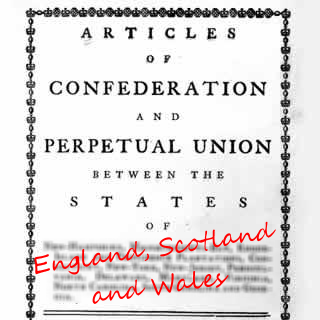During the UKIP conference in Birmingham I was slipped a piece of paper with details of UKIP's new devolution policy and some notes confirming that the NEC had approved it and it had the blessing of UKIP Wales who have been a pain in the ass over devolution for some time, considering it the work of Satan (or worse, the French).
When I first joined UKIP there was no policy on devolution other than a "Britishness" policy that said that much like the Tories in the late 90s, UKIP opposes devolution and wants a return to a unitary state but would tolerate Grand Committees of British MPs. Over the years I, along with others, have managed to talk some sense into the leadership (and membership) which culminated in a policy proposal written by Deputy Leader, Paul Nuttall, for an English Parliament and converting the House of Lords into a federal British Parliament.
Paul's policy was well received in England but less so in Wales where a tiny group of Big Britishers vocally argue against devolution based on an irrational and inaccurate belief that devolution is a plot by the EU to destroy the UK. It was Paul's policy that resulted in so many members of the English Democrats (the good ones, not the nutters and racists) abandoning that sinking ship and joining UKIP.
A new policy proposal was written and was given the seal of approval by UKIP Wales who think it's a rehash of the half-backed Grand Committee idea where British MPs elected in England, Scotland, Wales and NI would come together for a few days a month and make British laws for their own countries under a gentleman's agreement that they won't interfere in each others' affairs. The policy is somewhat further reaching than that and I suspect that nobody who's seen it so far truly understands the (positive) unintended consequences.
The new policy turns the Grand Committee idea on its head and instead of creating English, Scottish, Welsh and Northern Irish Grand Committees to make British laws for their respective countries, the national governments of the member states of the UK would be directly elected and the English, Scottish, Welsh and Northern Irish MPs would appoint representatives to the British government. The British government would be "indirectly elected" (ie. appointed) like the hated regional assemblies were. Clearly this creates something of a democratic deficit which is where the unintended consequences come into play.
It's difficult to see how you could give an indirectly elected British government parliamentary sovereignty rather than a directly elected national government. The only option is to make the national governments sovereign which would create a confederation. A confederation is a union of sovereign states and by virtue of that sovereignty, they would have the legal and constitutional power to secede from the union in their own right rather than relying on the Montevideo Convention (effectively restated by the EEC's Badinter Arbitration Committee so it doesn't matter that the UK didn't sign up to it) which is the usual way a state gets its independence.
The alternative is that you have an appointed and therefore less accountable body with the ability to over-rule or even abolish the national governments that appointed them. If you wouldn't give, for example, the Parliamentary Standards Committee the lawful right to unilaterally sack MPs, appoint its own government and prevent elections then you shouldn't entertain the idea of giving an appointed federal government parliamentary sovereignty.
Now, I'm more than happy with the idea of a confederation and it's something I've advocated for some time as the form of government that will prolong the union the longest as it is a consensual union rather than a prescriptive one which should be palatable to both unionists and separatists alike. On paper it makes the union weaker although in practical terms it makes it stronger because it puts it on a footing that should be acceptable to separatists.
I was asked for an opinion on how to deal with the gap in accountability that would arise from abolishing the House of Lords when Paul Nuttall was writing his policy proposal. The answer I came up with was a constitutional court along the lines of the German Bundesverfassungsgericht which would have the authority to choose what legislation it wants to rule on and its ruling would be binding. The same gap in accountability would also be present under a confederation and I maintain that a constitutional court is still the answer.
This policy is a bold move - literally reinventing the union in a way that no political party has ever proposed. Even the English Democrats who claim to be the English version of the SNP (they're not but everyone needs an aspiration, no matter how fanciful) haven't gone as far as this. A confederation is the best of both worlds for both unionists and separatists. The member states of a British Confederation would be sovereign nations able to leave the confederation at any time but they would still be in a British union, albeit voluntarily rather than because the law says they have to be. I, for one, am looking forward to UKIP announcing this policy formally and campaigning for this radical new form of government that finally brings equality and fairness to all the member states of the UK.



 wonkotsane is an author at Bloggers4UKIP.
wonkotsane is an author at Bloggers4UKIP.




